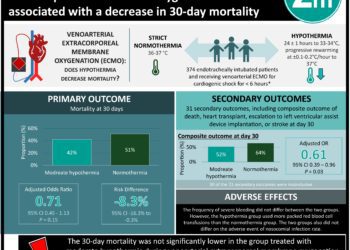Hypothermia in perinatal asphyxia encephalopathy preserves IQ
1. Hypothermia for newborns with perinatal asphyxia encephalopathy provided a long-term benefit in preserving IQ among survivors for those up to ages 6 and 7.
Evidence Rating Level: 1 (Excellent)
Study Rundown: Encephalopathy from perinatal asphyxiation has been associated with higher rates of mortality and neurodevelopmental impairment. Previous trials attempting to use moderate hypothermia (for 72 hours, within 6 hours after delivery) for these patients have demonstrated improved outcomes in terms of mortality and long-term disability, however most of the follow up was typically at 18-24 months.
This was the first study to publish long-term outcomes on patients with perinatal asphyxia encephalopathy that were randomized to either a hypothermia protocol or “standard care” (control). The primary outcome of the frequency of survival with an IQ score greater than 85 was achieved in 52% of those randomized to hypothermia versus 39% in the standard care group. The IQ score cut-off used in this study was determined as 1 standard deviation below the mean IQ score of the general population. However, the hypothermia protocol did not have any statistically significant effect on mortality. Hypothermia also led to an improvement in the following secondary outcomes as determined by their respective classification/scale: grade of disability, decreased cerebral palsy, gross motor function, manual ability and psychometric assessment.
As compared to the original trial (TOBY) with only 18 months follow up, a significant number of patients were unavailable for extended follow up. A total of 41 children were also unable to complete the test due to physical impairment or inability to cooperate therefore blinded assessors classified these children for the primary outcome. While the two randomized groups were well matched, there are also numerous determinants for cognitive performance that are difficult to capture or quantify (e.g., formal education). However, this is the first study to demonstrate a long-term benefit in various neurodevelopmental domains for those with perinatal asphyxia encephalopathy treated with hypothermia.
Click to read the study, published today in NEJM
Relevant Reading: Childhood Outcomes after Hypothermia for Neonatal Encephalopathy
In-Depth [randomized controlled trial]: This study randomized 325 newborns with EEG-confirmed perinatal asphyxiation to either “standard” care (control) or a hypothermia protocol within 6 hours after birth. Both groups were well-matched including gestational age, delivery complications, APGAR score and severity of EEG abnormalities. The primary outcome was an IQ greater than 85 as determined by the Weschler Preschool and Primary Scale of Intelligence III at age 6 or 7 years; this was achieved by 52% in the hypothermia group versus 39% in the control group (p=0.04). As compared to the original trial, 11% of the hypothermia group and 18% of the control group had no data available for the primary outcome in this study.
More from this author: Brodalumab effective in treating active psoriatic arthritis, Idelalisib plus rituximab improves progression-free survival in relapsed CLL, SSRI use during pregnancy not linked to increased risk of autism,Combo antifungal therapy most effective treatment for cryptococcal meningitis
Image: CC/Wiki
©2012-2014 2minutemedicine.com. All rights reserved. No works may be reproduced without expressed written consent from 2minutemedicine.com. Disclaimer: We present factual information directly from peer reviewed medical journals. No post should be construed as medical advice and is not intended as such by the authors, editors, staff or by 2minutemedicine.com. PLEASE SEE A HEALTHCARE PROVIDER IN YOUR AREA IF YOU SEEK MEDICAL ADVICE OF ANY SORT.








